A child from a small town disappears under less than normal circumstances and the lives of the townsfolk will never be the same. No, not Stranger Things. I’m talking about Netflix’s other sci-fi thriller about a missing boy, strange goings on near secretive government facilities, and families who don’t know how to deal with it: Dark.
Netflix’s first German-language original series, created by Baran bo Odar, Dark has been called “the German Stranger Things” or “Stranger Things for grown-ups” given its much more adult tone. But that’s not entirely accurate. For one, the shows were announced 6 months apart, with very few details about Stranger Things being known when Dark was announced and the premise already pitched, so I don’t think it’s entirely fair to call Dark a rip-off.
More importantly, while they have superficial similarities, Dark brings something new and different to the paranormal drama genre. The ‘bad guys’ are less straightforward, the dynamic between and among families more complicated, and the ambiance less a fun 80s nostalgia and more a sinister sense of déjà vu.
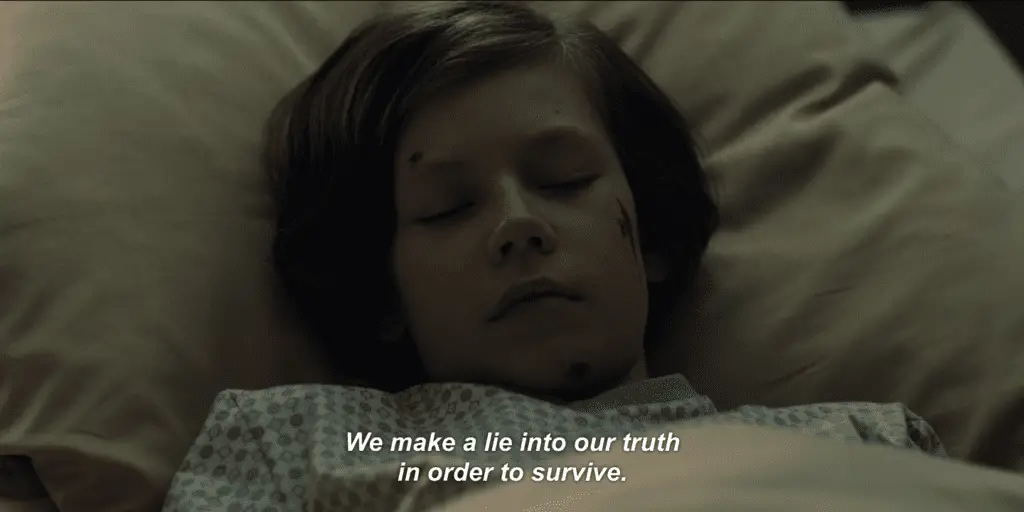
From the first moments of the show, Dark presents itself differently. It’s darker, more violent, and has a list of content warnings to go along with it. While I won’t get into spoiler territory or details in this review, for the sake of fairness, I’ll list the warnings now. That way, you can opt out of reading any further into this review and/or skip the show entirely.
Content warning for suicide, child endangerment, physical abuse, rape accusations, self-harm, and police brutality, as depicted on the show.
Suffice to say, we’re not in Hawkins anymore; Winden is a much darker place (badum tss).
Just A Boy, A Small Town, and A Wormhole
“The distinction between past, present, and future is only a stubbornly persistent illusion.”—Albert Einstein
Dark begins with a gravelly voice telling us about the illusion of time overtop a creepy, brooding score that perfectly sets the tone leading into the establishing shot of the cold open: a man’s suicide. Following the opening sequence—at once trippy and gorgeous—we meet up with Jonas, the son of the man who committed suicide. He struggles to fit into ‘normal’ life in the small town of Winden following the tragedy. Yet his isn’t the only tragedy, one of his schoolmates has gone missing and the police have no leads.
Everyone’s life gets even more complicated when Jonas and his friends head to the caves outside of town to hunt down the missing boy’s stash of weed. On the way home, Mikkel Nielson, the younger brother of Jonas’ friend Magnus and one-time girlfriend Martha, vanishes without a trace.
When we learn that Mikkel has been transported back in time to 1986, the voiceover and quote from Einstein begin to make sense. Stick with me here, this isn’t wibbly wobbly, timey wimey absurdity. This is where Dark gets simultaneously more thrilling and more terrifying. As events unfold across three different timelines (2019, 1986, and 9153), we begin to wonder if, as other characters posit, time is a prison and people have no freedom whatsoever. Are all actions and reactions nothing but links in a causal chain over which humanity has absolutely zero control? Can we free ourselves from our situatedness in time and space? Or are we merely pawns for greater powers we cannot fully understand? Is time an illusion, or something more dangerous?
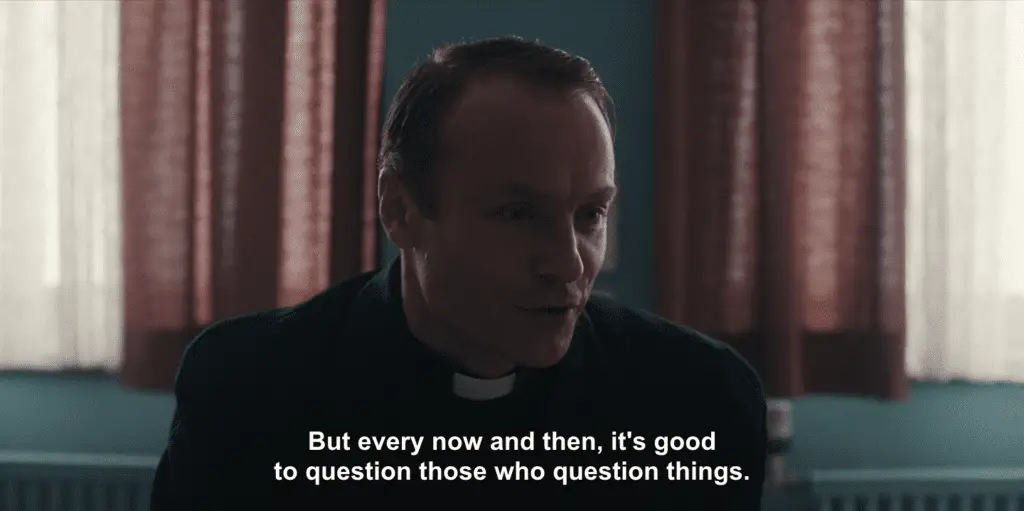
A Time-Warped Whodunnit
Dark asks a lot of philosophical questions outright, but don’t let that put you off. It’s less up its own ass than it sounds. For a series about time travel, black holes, and paradoxes, significantly more space is devoted to the characters themselves and watching the web of interconnections unfold. Where Stranger Things falls more on the supernatural end of the sci-fi spectrum, the straight-up sci-fi elements in Dark are the plot devices for a character and family drama.
I watch a lot of European crime dramas, and to my mind, Dark has much in common with shows like The Tunnel and Broadchurch. The entire season is a mystery the characters are trying to unravel, a maze they’re trying to find the center to and then work their way out of. We’re along for the ride as we, too, get caught up in the web of connections. We, too, are left in the dark (heh) about some of the core motivations and identities of some of the key players. Like the mythical Theseus, and Jonas himself, we’re just trying to find our way out of the labyrinth. And it’s a damn good labyrinth. Full of twists, turns, and a creeping sense of doom.
Yet even that isn’t the best way to explain the maturity of tone and overall sense of deep foreboding that permeates the show. Dark takes its time. It’s somber, lingering, and downright meditative sometimes. But it never loses sight of the deep sense of wrongness about everything and everyone in Winden. It’s one of those shows that’s much easier to experience than describe.
Everything is Connected
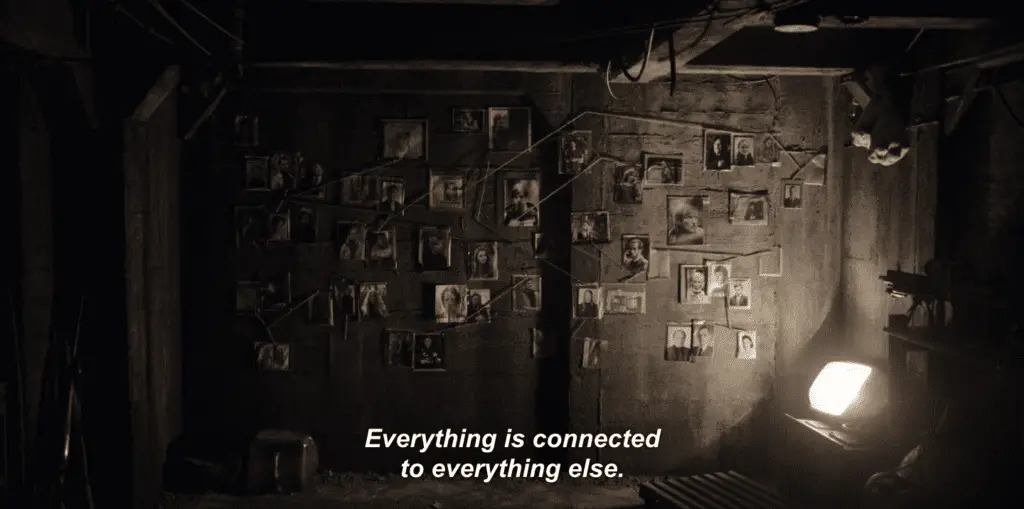
Dark weaves together past, present, and future into one giant web of connections. Everything is a knot Alexander the Great himself would want to cut just by looking at it. But the web is what gives the story it’s depth. Not just everything, but everyone is connected. The connections between families and across time move the knotty time paradoxes from the theoretical to the deeply personal. Theories, and the choices made based on them, have consequences for living people (living within the world of the show, that is). And everyone has to live with those consequences.
If you thought one complicated family dynamic was compelling, get ready for four complicated family dynamics and the one giant dynamic born of their inextricable bonds to each other. The giant mess that is the Kahnwald, Nielson, Doppler, and Tiedemann history is gloriously broken and all kinds of fucked up.
That’s one of the things I love about Dark. It’s about people and the ways they hurt each other, both intentionally and accidentally. Very few of the characters come out without at least a bit of egg on their face. Others have egg everywhere. This isn’t a show about scrappy kids learning about the power of friendship or well-intentioned adults learning how to listen and think beyond the literal world to something more fantastical. (Though that is a really good thing and I adore Stranger Things, too, just for different reasons.)
This is a show where at least every character is an asshole to someone else at some point. Everyone is hurting, grieving, and anxious in their own way, some in healthier and more effective ways than others. Everyone is a bit self-absorbed, but it’s understandable because sorrow and fear do that to people. Everyone has a shitty moment, but the shittiness feels real, human. And some of that shittiness is really, really shitty. I’m not going to paint it otherwise or make excuses. Hurting people do awful things to each other. The difference between who gets my sympathy and who is just an asshole is in what they do afterward and how much they let that awfulness define them.
And you won’t have sympathy for everyone. Ulrich and Hannah can be downright repulsive, and even Franziska, who I like overall, has some awful moments with her younger sister. At the same time, it’s hard not to have sympathy for at least one, if not multiple characters. I latched onto teenage Martha early on and her story breaks my heart. Charlotte was an early and consistent favorite. Old Claudia, on the other hand, became a favorite of mine toward the end of the series after not making a strong impression on me early on.
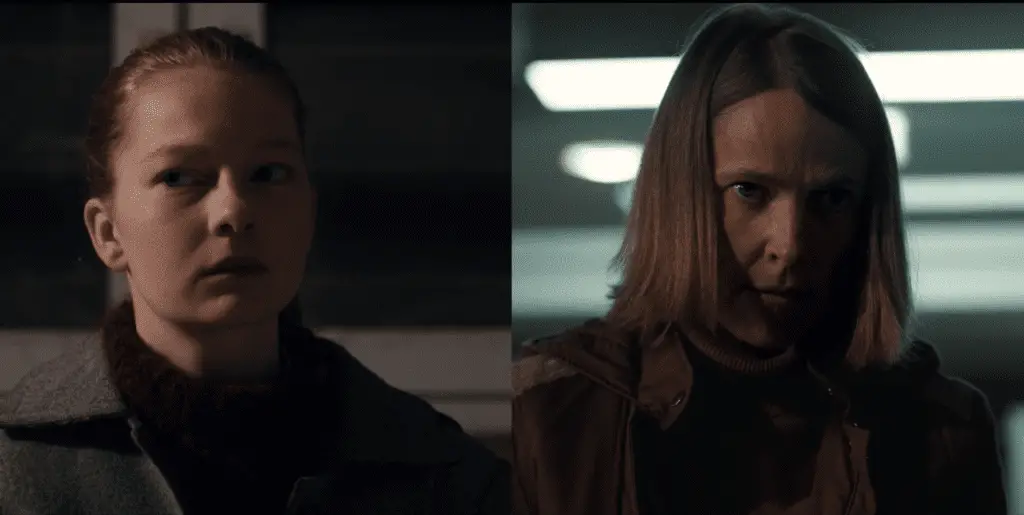
The 1986 and 1953 timelines gave me a lot of sympathy for characters whose older presentations turned me off, like Regina, Egon, Alexander, and Katharina. That’s part of the beauty of using time travel, we get to see how people came to be who they are in the ‘present,’ which is a great way to generate pathos.
I will mildly spoil you and say there’s a delightful background woman loving woman romance in the 1953 storyline that gives me all the feels. Because fuck heteronormativity. I hope [edited for spoilers] have a long and happy life away from Winden.
Yet no matter how sympathetic or unsympathetic you might find one or all of the characters, you can’t fault them for being flat. Hannah might be the literal worst, but she’s a well-rounded worst. She’s a horrible person, but a person nonetheless. She’s complex and dynamic in her terribleness. Same with Ulrich, who manages to be both awful and pitiful, sometimes in the span of a second.
And the acting is superb. This is one of the best casts I’ve seen and every single one of them sells their role. Louis Hofmann, who plays Jonas, carries the tragedy of his story with such elegance and heartbreak that you can’t look away. The acting required of his role is impressive at any age, and he nails it at 20 years old. Color me gobsmacked.
Oh, and the casting of different actors to play the younger and older versions of the same character is eerily spot on. I truly haven’t seen it’s like.
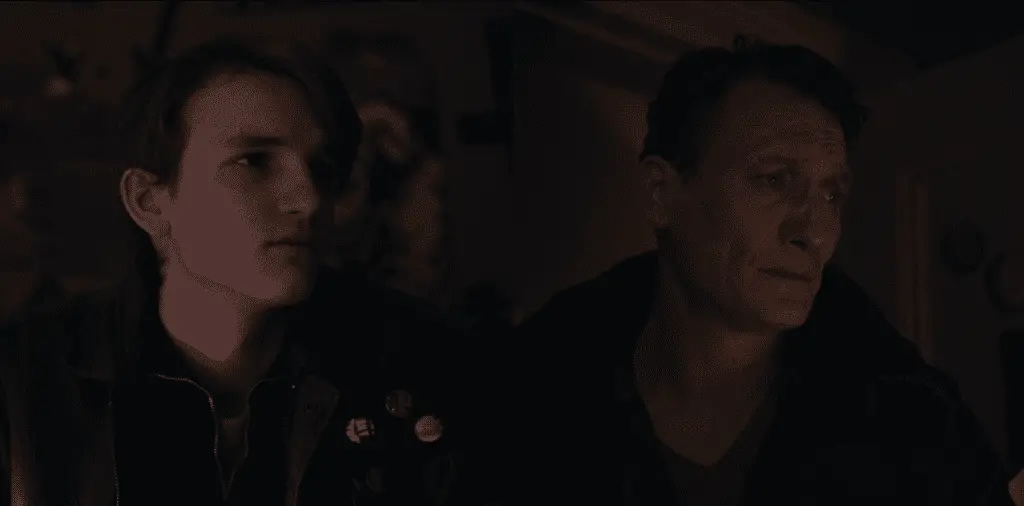
The all white cast may be jarring to American fans used to racial diversity. I hesitate to call it out because I don’t know how accurately this reflects life in small town Germany. Finding racial demographics in European countries like Germany is notoriously difficult, as the government does not collect racial statistics in census data like we do here in the US.
So if there are any German Fandomental fans out there, feel free to chime in with details, either positive or negative. I don’t want to be inaccurate. All I can say is that it does feel odd to watch a show with an almost entirely white cast given how diverse so much of the media I typically consume is. Just something to be aware of.
It’s All in the Details
Dark wouldn’t be the show it is without the music and cinematography. For me, music in visual media like film and television falls into three categories: so bad I notice that it’s out of place, so good that I hardly notice it at all it’s so seamless, and so amazing that I think about how much it is enhancing my experience of what I’m watching. Dark falls firmly into the latter category. It’s beautiful, haunting, and will stick with you long after you finish an episode. It sets the tone impeccably and never feels out of place or unnecessary. As with the visual style, it’s integral to fully appreciating what the show is doing.
The symbolism and visual metaphor add so many layers that I feel like I need to rewatch it in order to truly appreciate everything. Symbolism is my jam, and Dark more than scratched that itch; it was the reason I watched Dark in the first place. Like Stranger Things, Dark truly understands its chosen medium and makes effective use of the showing vs telling potential of visual juxtaposition. It’s the kind of show you can’t watch while doing something else or you’ll miss important clues and foreshadowing. If you like ambiance, symbolism, visual metaphor, and intricate puzzles, Dark is the show for you.
A Note on Subs v. Dubs
Ah, the age old debate. Do I watch it in the original language with subtitles or in my native tongue? I typically prefer subs. It means I can’t get work with my hands while I watch, but given how intricate the symbolism is with Dark, I wouldn’t want to do that anyway. Mostly, I just prefer hearing the original actors and language. Plus, I find lack of synchronicity between lip/facial movements and sound quite distracting.
I did listen to the English dub for part of the first episode, though, and it’s well done. So, if that’s your preference, I don’t think you’ll miss much. I’ve seen criticisms of the subtitles being inconsistently placed on screen, but I didn’t have that problem. That may have been an early issue that has been fixed.
All that to say, it comes down to personal preference. Whatever is the easiest way for you to watch, do it and don’t let anyone judge you for it.
The End is In the Beginning
I found Dark tremendously engaging. Calling it the German Stranger Things may not be entirely accurate, but I do think fans of the former will enjoy a lot about Dark. It has a darker tone and the characters are less straightforwardly sympathetic, but that’s not a bad thing. Dark is a show about messed up people doing messed up things to each other when they’re hurting. With black holes, time paradoxes, and philosophical questions about the nature of human choice and freedom thrown in. Plus lots of visual metaphor, symbolism, and amazing music.
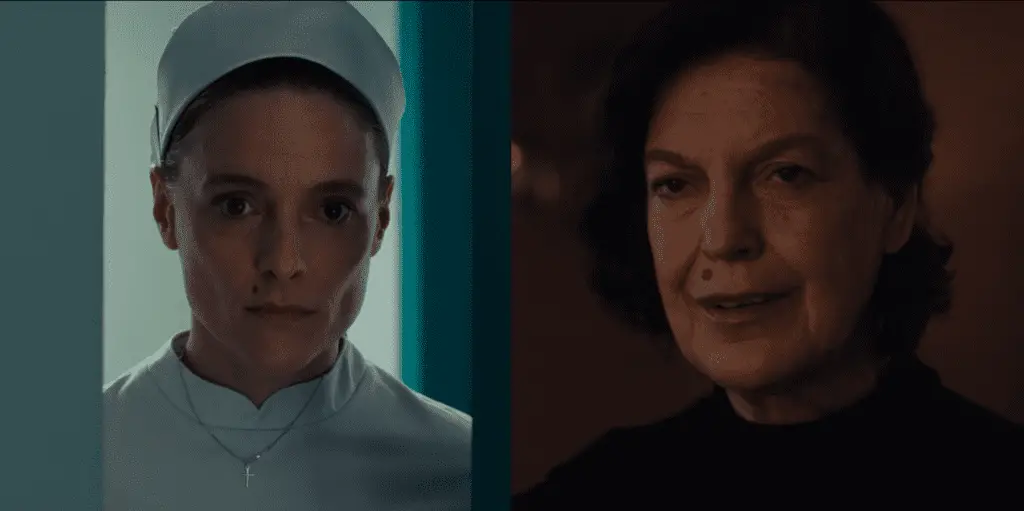
Everything is well written, perfectly paced for the story it wants to tell, and the acting is on point. I have a hard time finding anything to gripe about. My only caveat is the content warning I gave at the outset. It’s not gory or exploitative, but what violence we do see can be deeply disturbing, so it’s not for everyone.
—
Dark has been greenlit for a second season, though there are currently no details regarding when that will air. Hopefully soon! When it comes on, you can be sure that I’ll watch and review it. I literally just finished watching it, and I already want to watch it again. I think I’m going to make my partner watch it with me. He’ll thank me.

